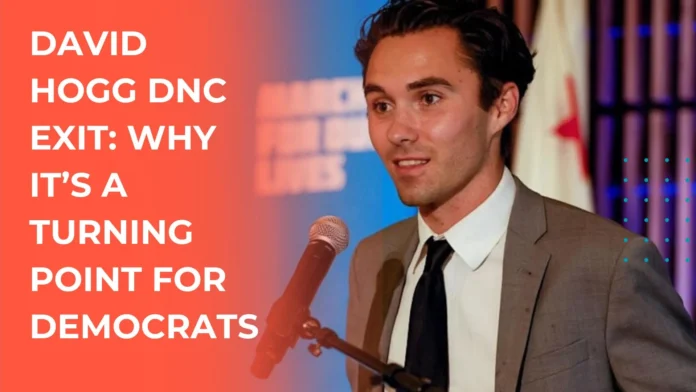A Shock to the System: David Hogg DNC Exit
In an unexpected political twist, David Hogg, a Parkland shooting survivor and rising progressive voice, has stepped down from his role as vice chair of the Democratic National Committee (DNC)—just four months into his tenure.
The departure comes amid internal friction and strategic disagreements, raising urgent questions about the direction of the Democratic Party, its generational divide, and its readiness to embrace dissent from within.
But this is more than just a procedural reshuffling—it’s a pivotal moment reflecting the tug-of-war between youth-driven activism and establishment politics.
Why Did David Hogg Leave the DNC So Suddenly?
The story began when the DNC voted to remove Hogg from his vice chair position following a procedural complaint. While he was given the opportunity to run again, Hogg surprised many by announcing on X (formerly Twitter) that he would not seek reelection.
“I need to do this work with Leaders We Deserve, and it is going to remain my number one mission to build the strongest party possible,” Hogg said.
This decision, though voluntary on paper, came after a heated internal clash over Hogg’s leadership in Leaders We Deserve—a progressive organization he co-founded to challenge ineffective Democratic incumbents in upcoming primaries with a $20 million war chest.
DNC’s Mixed Reactions: Relief, Regret, and Realignment
Hogg’s departure has caused a stir in the Democratic landscape. While some committee members expressed sorrow over losing a passionate voice, others welcomed the return to focus.
“There’s relief we can finally move past this distraction,” said Michael Kapp, a California-based DNC member, hinting at Hogg’s disruption of party unity.
Meanwhile, John Verdejo of North Carolina admitted he was caught off guard by Hogg’s withdrawal. “I was surprised and taken aback that he would decide not to run after the votes came in,” he told The Hill.
Howard Chou of Colorado struck a more nuanced tone, calling Hogg’s departure “a loss,” yet expressing “indifference” over his reelection plans. He acknowledged the young activist’s energy could have contributed positively to the party’s momentum.
“I really wanted to see his leadership contribute to our success,” Chou added.
But perhaps the most cutting comment came from Clay Middleton of South Carolina, who suggested Hogg might have opted out to avoid tough questions had he chosen to run again.
The $20 Million Flashpoint: Challenging the Democratic Status Quo
At the heart of the controversy lies Hogg’s bold initiative: targeting fellow Democrats.
Through Leaders We Deserve, Hogg planned to primary incumbent Democrats deemed ineffective—a move that ignited intense backlash from party veterans and leaders.
In private meetings, DNC Chair Ken Martin voiced frustrations over this strategy, warning it could splinter the party ahead of critical national elections.
“It’s one thing to energize the base,” one senior strategist said off-record, “but it’s another to take a sledgehammer to your own foundation.”
The internal feud laid bare the rising tension between the party’s progressive youth wing and its centrist establishment, echoing similar rifts seen during Bernie Sanders’ primary campaigns.
Voices of Support: Not Everyone is Ready to Let Go
Despite the tension, Hogg isn’t leaving politics. His advocacy work and youth outreach remain central to his mission.
Sunjay Muralitharan, National President of the College Democrats of America, publicly thanked Hogg on X for always listening to student voices and empowering local leaders.
“Whenever he was on the road, he asked to be connected with local College Democrats chapter leadership,” Muralitharan wrote. “He uplifted our voices at times when it felt like no one was listening.”
He emphasized that Hogg’s exit from the DNC does not mean his political journey has ended—only that it’s entering a new phase focused on grassroots organizing and generational inclusion.
What This Means for the Democratic Party Ahead of 2026
Hogg’s story is not just about one man leaving a leadership post—it’s symbolic of a broader ideological battle for the soul of the Democratic Party.
With the 2026 midterms looming, the DNC faces a strategic crossroads:
- Should it silence dissent to maintain unity?
- Or embrace new voices and risk internal disruption?
Hogg’s confrontation with Democratic incumbents shows that progressive pressure isn’t going away. If anything, it’s getting better organized, better funded, and more determined.
Lessons from the Fallout: Balancing Youth Power and Party Loyalty
David Hogg is unquestionably a divisive personality. But his tenure—even if short-lived—forced the DNC to reexamine its tolerance for intraparty critique, especially from younger, digital-savvy activists.
For a party that prides itself on inclusivity and change, the challenge lies in channeling internal energy constructively without suppressing innovation.
As younger voters continue to demand accountability, transparency, and bold action on issues like gun reform, climate change, and voting rights, voices like Hogg’s may become harder to ignore—whether or not they hold official titles.
Final Thoughts: A Fork in the Road for Democratic Unity
David Hogg’s exit from the DNC marks the start of a new political strategy rather than the close of a chapter. It reminds us that today’s political movements are increasingly youth-led, values-driven, and digitally mobilized. Whether the Democratic Party adapts to this reality will determine not just its success in 2026, but its relevance in a rapidly evolving America.


